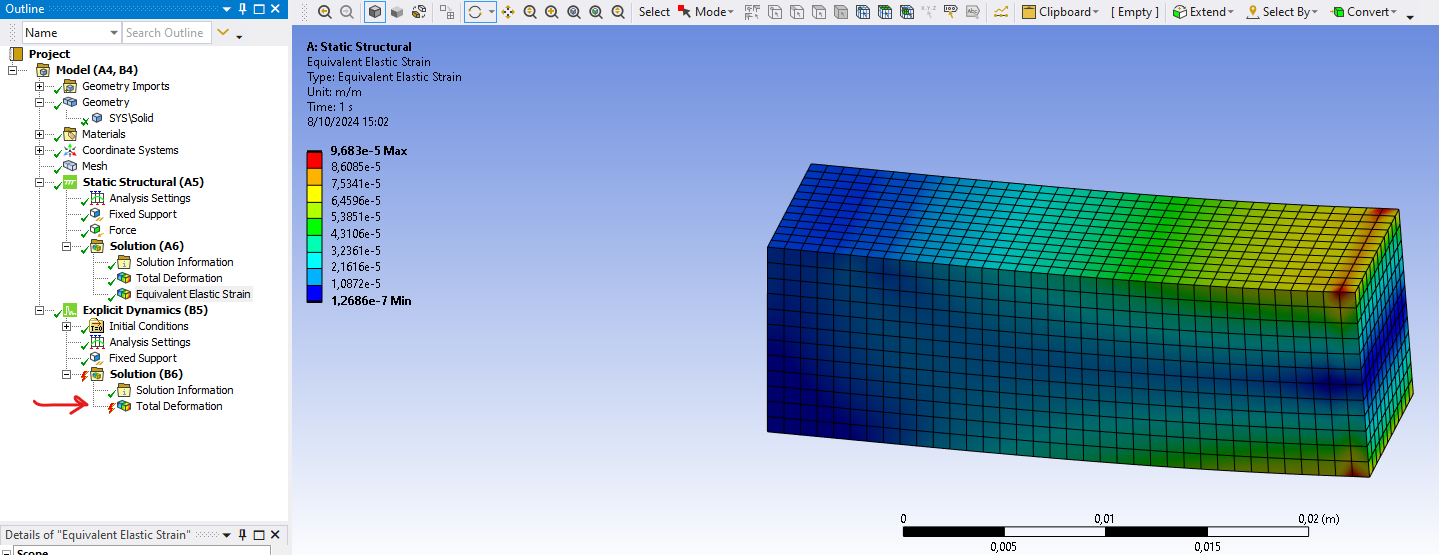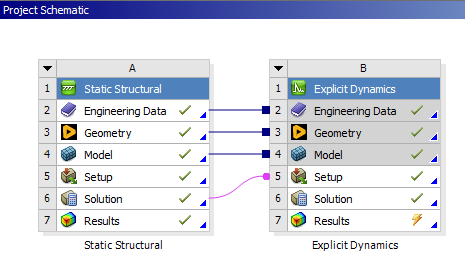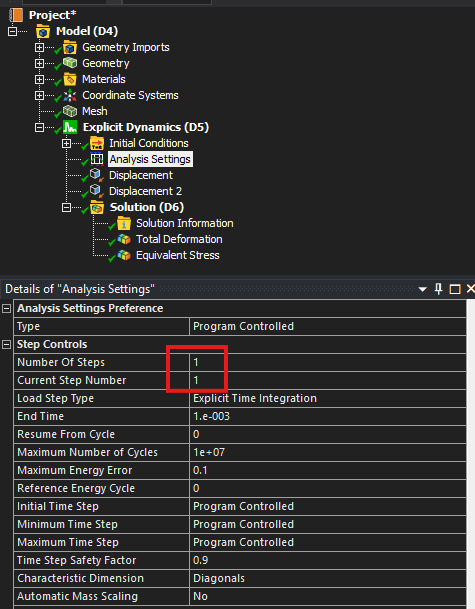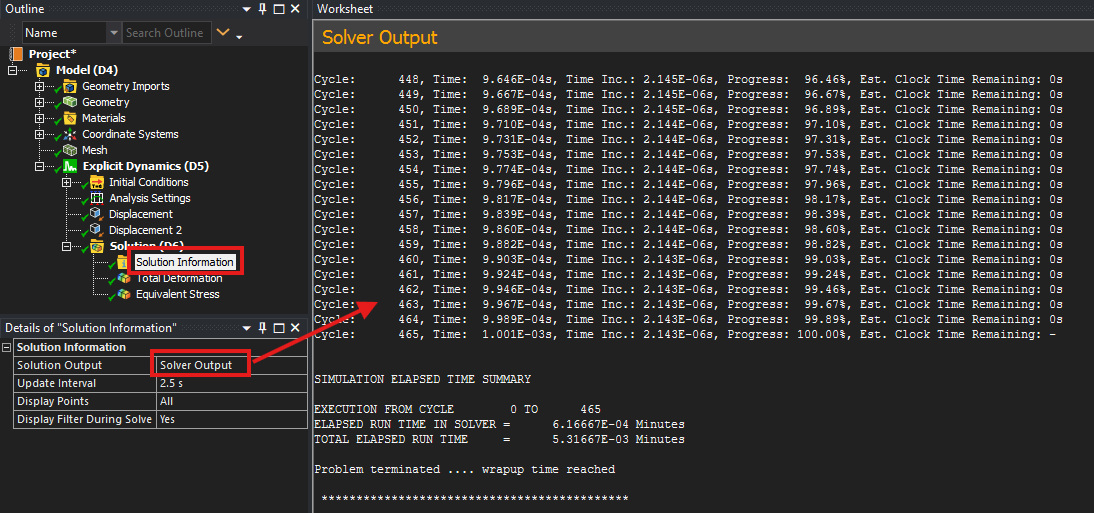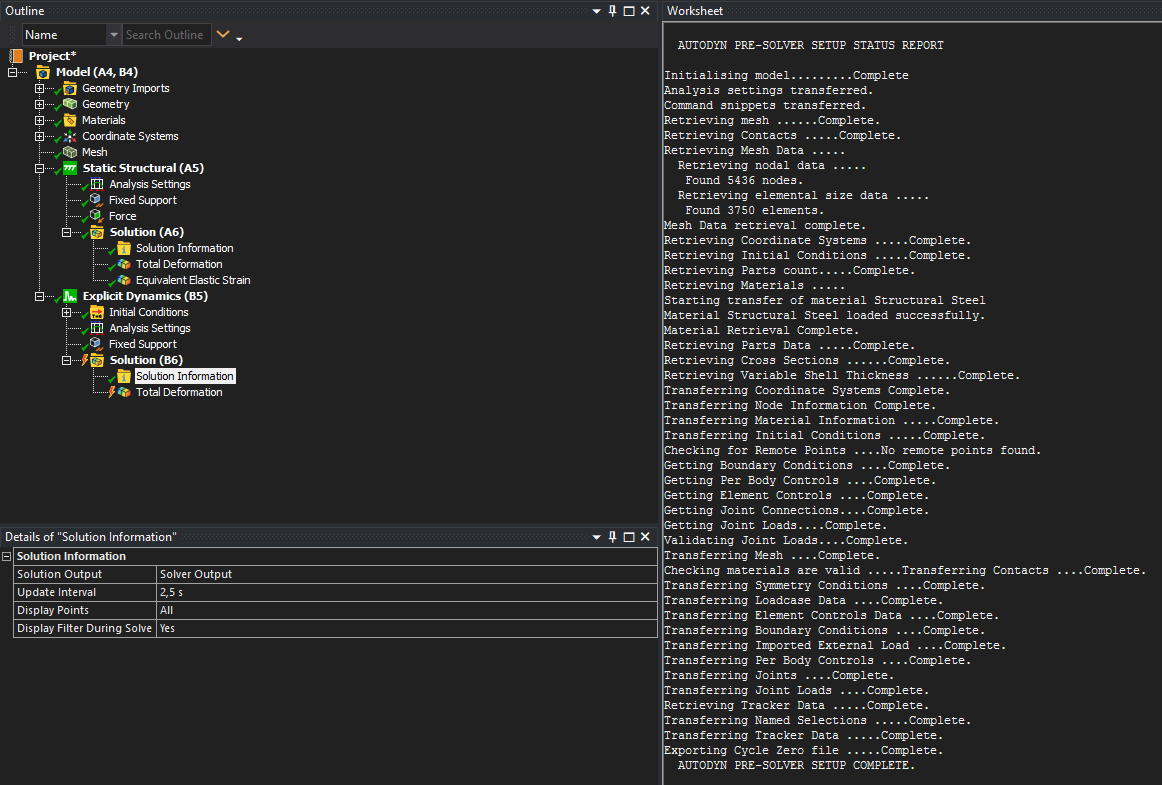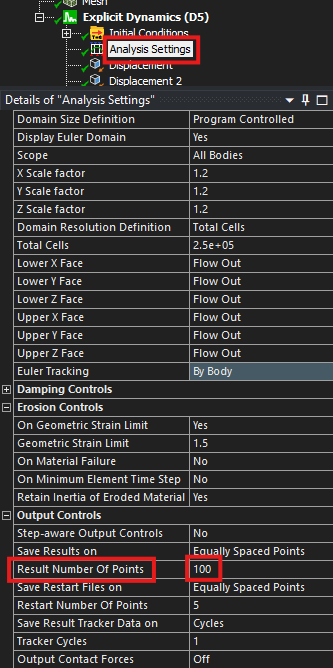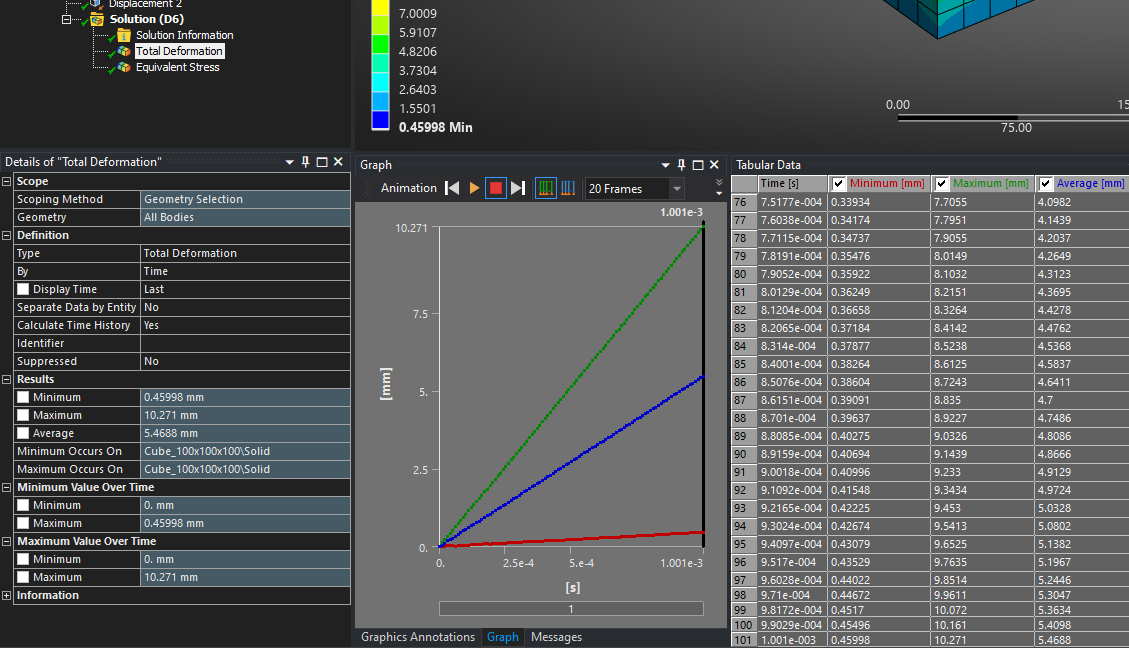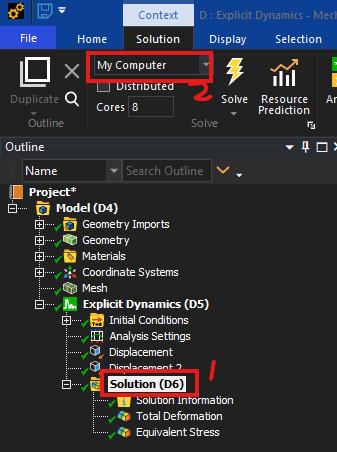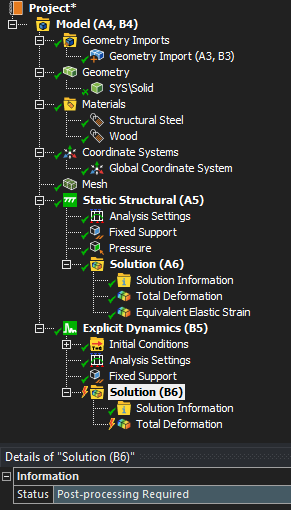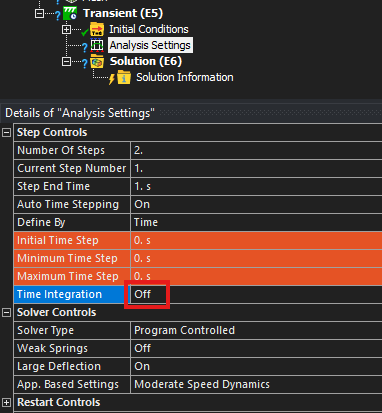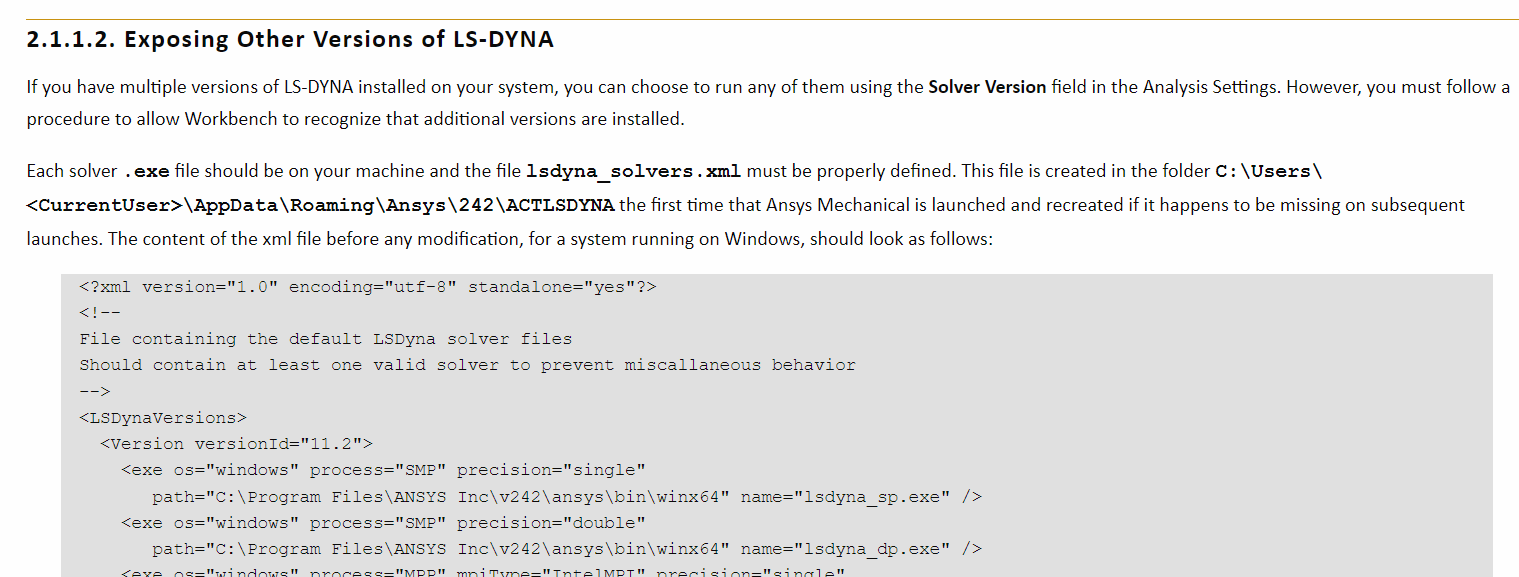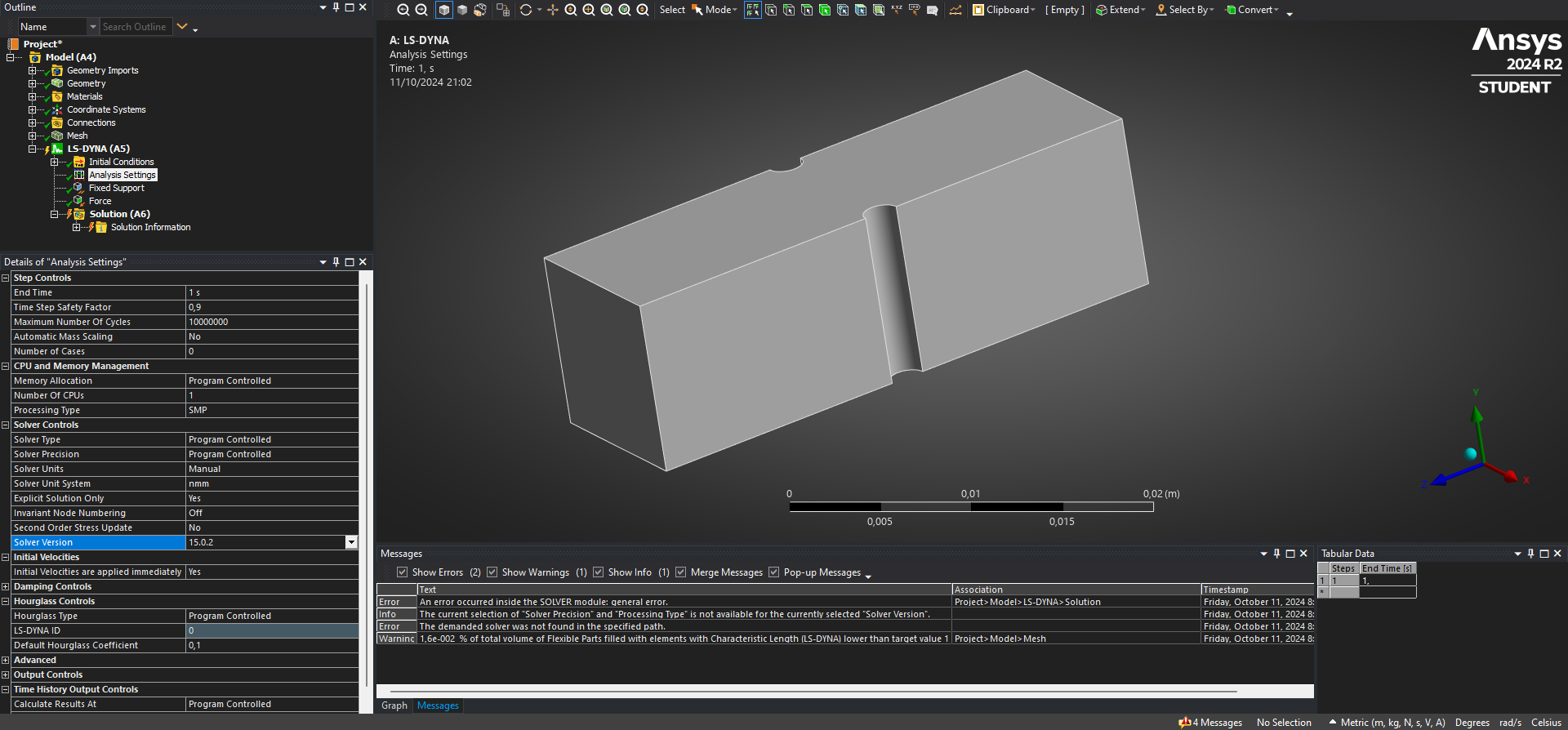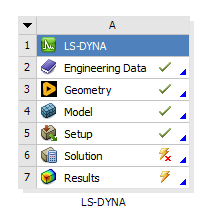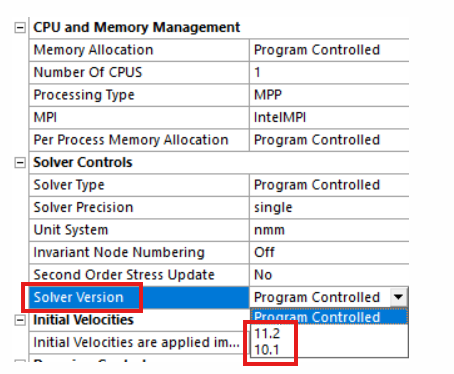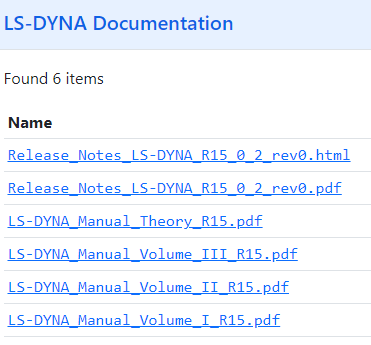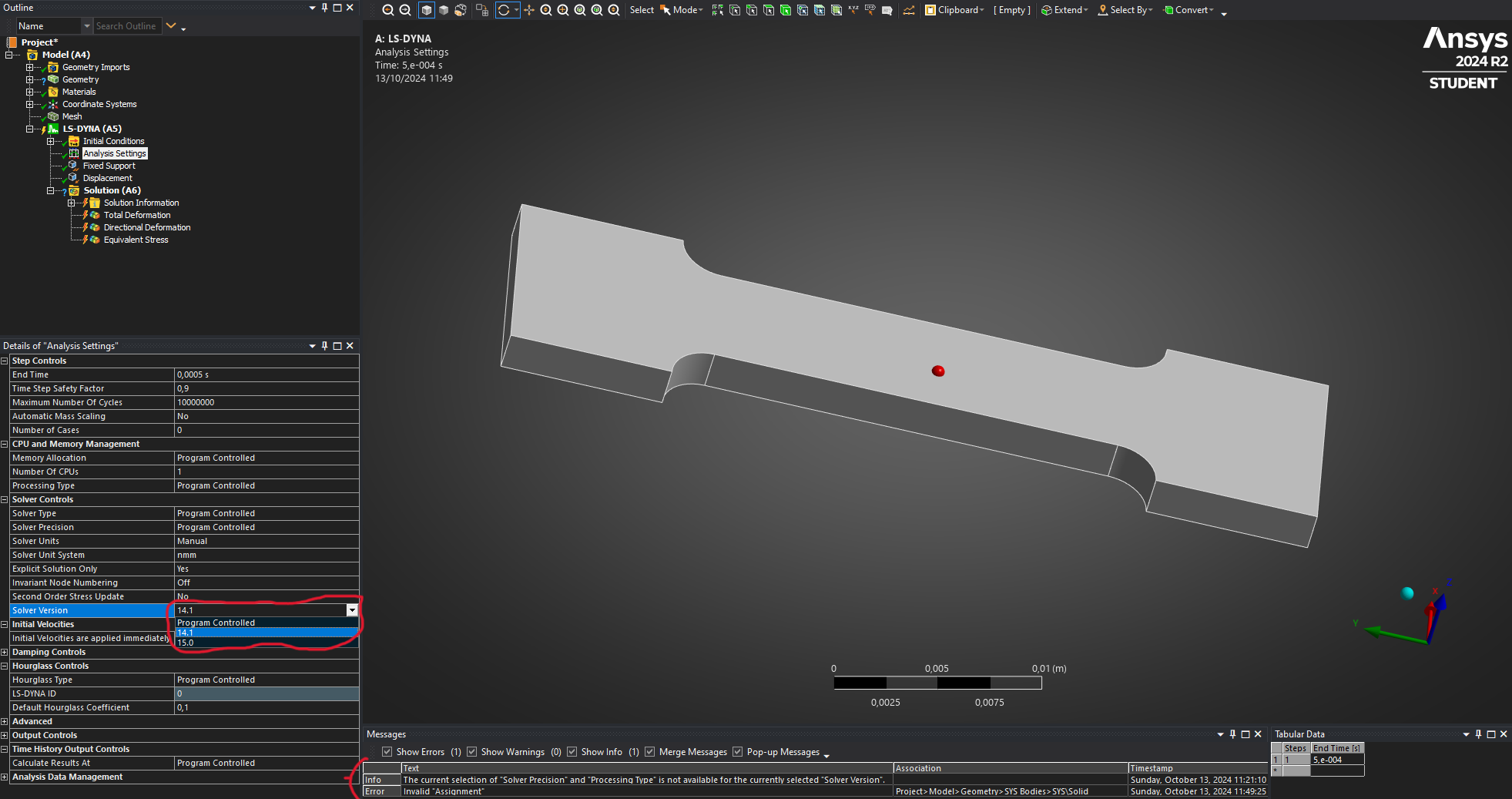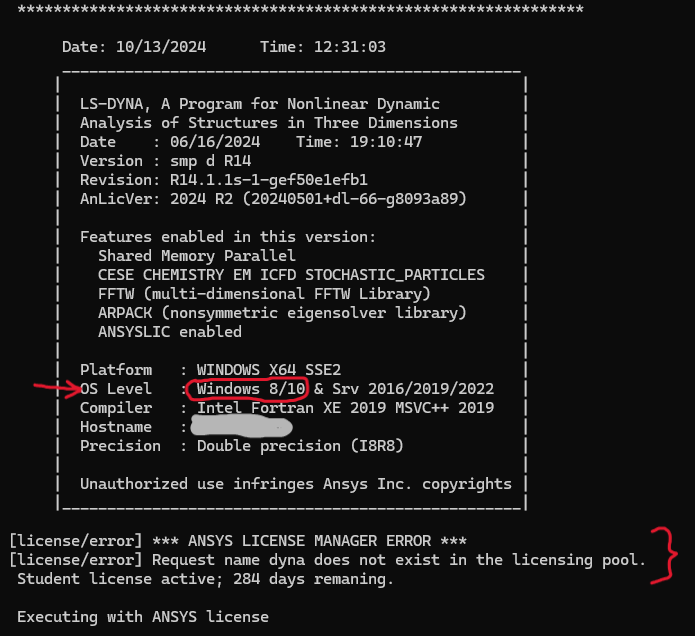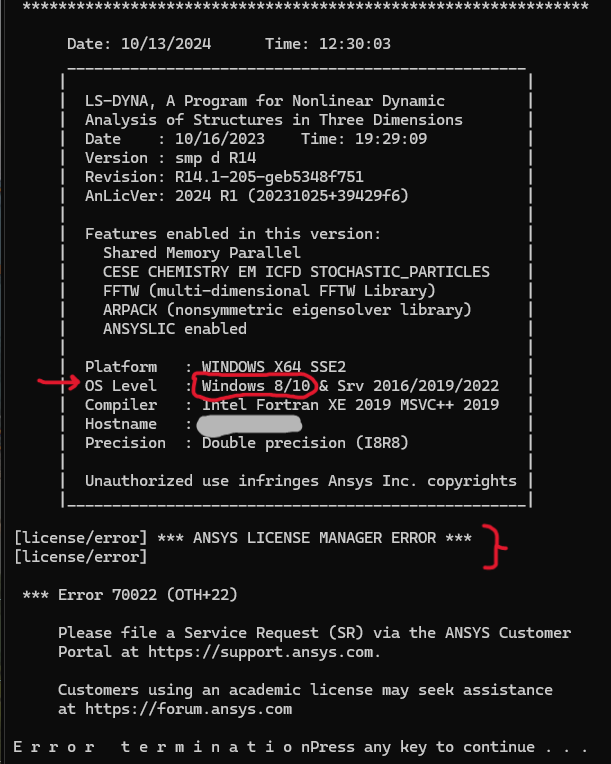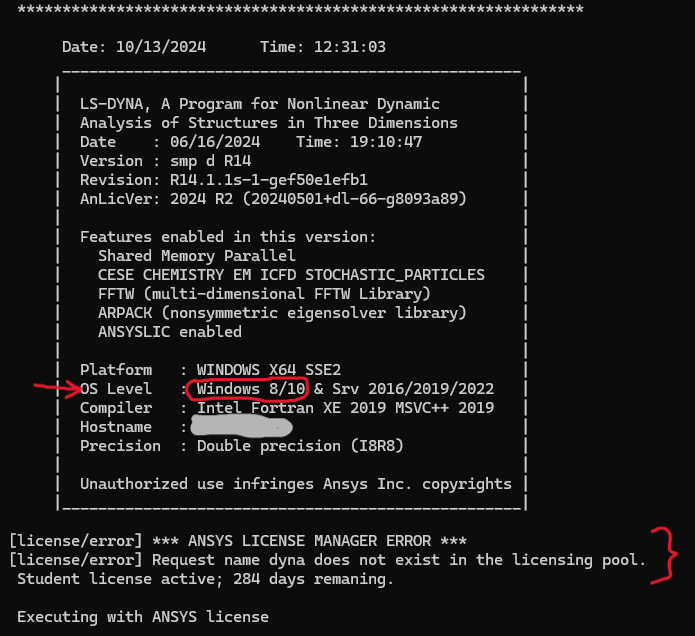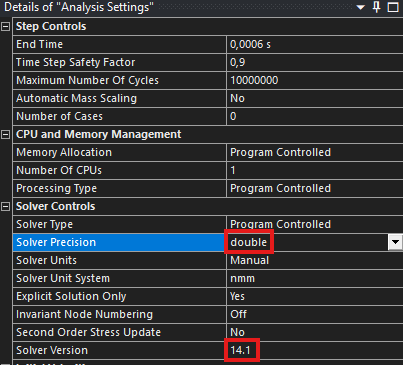TAGGED: error-explicit-dynamics, mechanical
-
-
October 8, 2024 at 1:09 pm
bram.dupre
SubscriberIn the end of the calculation of the Explicit Dynamics simulation I always get the same error in Mechanical (2023 R2 and 2024 R2). I tried numerous solutions I found on he internet but nothing worked so far. (moving the workbench project folder, changing the scratch folder...)
Any suggestions on this issue? The project is set on hold because of this error.
OS: Windows 11 (64-bit)
Ansys version: tested in 2023 R2 and 2024 R2Error in Mechanical:
Workbench:
Any help is greatly appreciated.
-
October 10, 2024 at 11:54 am
mohan.urs
Ansys EmployeeHey,
This usually occurs in explicit dynamics when the time step selected or the time interval scoped to the result is invalid.
Try to make sure that you have proper 'Display Time' set or a proper timestep that you are extracting the results for.
Let me know if this works out.
Thanks
-
October 10, 2024 at 2:58 pm
bram.dupre
SubscriberI am not sure what you mean. These are my Analysis Settings form the Explicit Dynamics. I tried it with all kinds of geometry (longer beams, other materials), but nothing changes. I played with the “Number of Steps” between 20 and 200, and with the “End Time” between 0.5s to 0.0005s. I should receive a result which shows some oscillations of the beam after removing the load from the Static Structural. This tutorial shows what I try to do in the simple setup before I continue to our actual, much more complex project. YouTube example
In order to start simple, I try to fix this issue first.
Our main project involves the simulation of the dynamic snapback effect of a specific rope type. However, I not sure which components to use in workbench. The basic setup can be compared with this simple example. A Static Structural (is the input) to tension the rope and then we release the tension in the next simulation step which should calculate the speed, acceleration and large scale complex deformation of the rope. I presume we should use LS-Dyna or Explicit Dynamics in our setup. However, as we know we will approach speed of sound, the air resistance/ high speed cfd effects should be taken into account in every step of the second phase of the simulation.
Thank you for your feedback.
-
October 10, 2024 at 6:48 pm
Reno Genest
Ansys EmployeeHello,
Have you tried using LS-DYNA?
Why do you have 200 steps? Are there different loads an BCs in each of the steps? I would put the # of step to 1 and specify the end time required.
The first step in troubleshooting this problem is to look in the solver output and check for error and warning messages:
Let me know how it goes.
Reno.
-
October 10, 2024 at 7:07 pm
Reno Genest
Ansys EmployeeHello,
In your case, the solution seems okay because there is a green check mark next to "Solution Information".
There are 2 warning messages:
If the result file cannot be opened, you won't be able to get the results.
I would clear the solution, set the # of steps to 1 and use all default Analysis Settings (only specify the end time), delete the results objects (Total Deformation) and solve again.
Which version of Ansys Workbench are you using?
Let us know how it goes.
Reno.
-
October 10, 2024 at 9:00 pm
bram.dupre
SubscriberHi Reno,
I use 200 steps because I would like to replicate the pulsing curve of the YouTube tutorial:
However, I tried to solve a fully resetted Explicit Dynamics, changed the end time and set the # of steps to 1 in the default Analysis Settings. This is a screenshot of the Solution Information of my new simulation:
Note I added the Total Deformation again afterwards and evaluated the result. I had no errors without the "results", but that is expected.
I found an error in the stdSubmit.log that might be related to the issue, but was not able to solve it yet:
Running Solver : C:\Program Files\ANSYS Inc\ANSYS Student\v242\aisol\bin\winx64\Ansys.Solvers.Explicit.Launcher.exe -input ".\admodel_0.ad" -exd -double -machines localhost:4
Checking remote machine response
Problem accessing remote machine
Unable to create saved verbose file. Cannot write to C:\Program Files\ANSYS Inc\ANSYS Student\v242\aisol\bin\winx64\AutodynWrapperSavedVerbose.txt.I tried to get LS-Dyna working in this setup, but had no time to actually run and debug it.
I use these versions:
2024 R2
Point Releases and Patches installed:
Ansys Service Pack 2024 R2.13235604
Discovery 2024 R2.13235604
Core WB Files 2024 R2.13235604
Ansys Dynamic Reporting 2024 R2.13235604
SpaceClaim 2024 R2.13235604
CFX (includes CFD-Post) 2024 R2.13235604
Chemkin 2024 R2.13235604
EnSight 2024 R2.13235604
FENSAP-ICE 2024 R2.13235604
Fluent (includes CFD-Post) 2024 R2.13235604
Polyflow (includes CFD-Post) 2024 R2.13235604
Forte (includes EnSight) 2024 R2.13235604
TurboGrid 2024 R2.13235604
ACIS Geometry Interface 2024 R2.13235604
AutoCAD Geometry Interface 2024 R2.13235604
Catia, Version 4 Geometry Interface 2024 R2.13235604
Catia, Version 5 Geometry Interface 2024 R2.13235604
Catia, Version 6 Geometry Interface 2024 R2.13235604
Creo Elements/Direct Modeling Geometry Interface 2024 R2.13235604
Creo Parametric Geometry Interface 2024 R2.13235604
Inventor Geometry Interface 2024 R2.13235604
JTOpen Geometry Interface 2024 R2.13235604
NX Geometry Interface 2024 R2.13235604
Parasolid Geometry Interface 2024 R2.13235604
Solid Edge Geometry Interface 2024 R2.13235604
SOLIDWORKS Geometry Interface 2024 R2.13235604
Speos 2024 R2.13235604
Aqwa 2024 R2.13235604
Autodyn 2024 R2.13235604
Material Calibration App 2024 R2.13235604
Customization Files for User Programmable Features 2024 R2.13235604
Mechanical Products 2024 R2.13235604
Motion 2024 R2.13235604
Academic Student 2024 R2.13235604 -
October 10, 2024 at 9:11 pm
Reno Genest
Ansys EmployeeHello,
Ok, you don't need the 200 steps to capture the vibration. Explicit dynamics takes small timesteps automatically. The explicit timestep is calculated based on the CFL condition (element size and material density).
So, to capture the vibration, you need to set the end time so that you can capture the vibration of the beam. In the tutorial, it seems they used an end time of 0.219s:
Also, make sure you output the result at a high enough frequency to capture the vibration. The default is to output 20 results over the time of the simulation. If the end time is 0.219, it means you will have a result every 0.219s/20 = 0.01095 s. This may not be enough. I would set the result output to 100:
This way, you will have 100 results in time that you can animate:
Reno.
-
October 10, 2024 at 9:14 pm
-
October 10, 2024 at 9:53 pm
bram.dupre
SubscriberHi,
In the tutorial they used version 2020 R2. In this example they use an “End Time” of 2.e-002, but I do not see why they get an end result on 0.219.
I run this solution on the foreground of my computer and changed the “Result Number Of Points” to 100 (and tried to play with this value too). Unfortunately, still the same error messages.
Thank you,
Bram
-
October 10, 2024 at 10:04 pm
Reno Genest
Ansys EmployeeHello Bram,
The end time cannot be 2e-2s if they have results at time 0.219s.
Are you able to run a simple cube model on its own (no Static Structural) with Explicit Dynamics? If not, there may be a problem with your installation.
If you can run a simple cube, then maybe there is a problem with the tutorial model.
Note that Ansys employees are not allowed to upload and download models from the Ansys Forum.
If you are a commercial customer, please create a support case on the Ansys Customer Support Space (ACSS) and we will have a look at the model:
customer.ansys.com
I recommend that you try with LS-DYNA.
Another option for this tutorial would be to use Transient Structural. Load the beam statically in step 1 (Time Integration=off) and in step 2 remove the load and let the beam vibrate dynamically (time integration=on):
Reno.
-
October 10, 2024 at 10:58 pm
bram.dupre
SubscriberI am using the student version of the software, as a university student (master) in industrial engineering.
I tried a simple compression of a cube. I still got the same errors. It is probably the installation, but I wonder if it might be a bug as I already tried this with version 2023 R2 and 2024 R2. I couldn’t test it on other PC’s yet. I found similar errors on other forums from previous versions claiming different things like the location of the project on the drive might be restricted by the administrator rights on Windows 11. I also found things related to the “\admodel_0.ad” file which should be “\admodel_0_0.adres” or so. I tried to solve the issue ith both methods without succes.
Could there be an error because I run this in Belgium? PC’s are set for decimal sign “,” instead of “.” in America etc. I found another article claiming a certain file path was using “;” instead of “.” which could be related to location defaults. I also tried to play with my PC’s settings, but had no succes so far.
Using LS-Dyna as a standalone simulation causes some new errors:
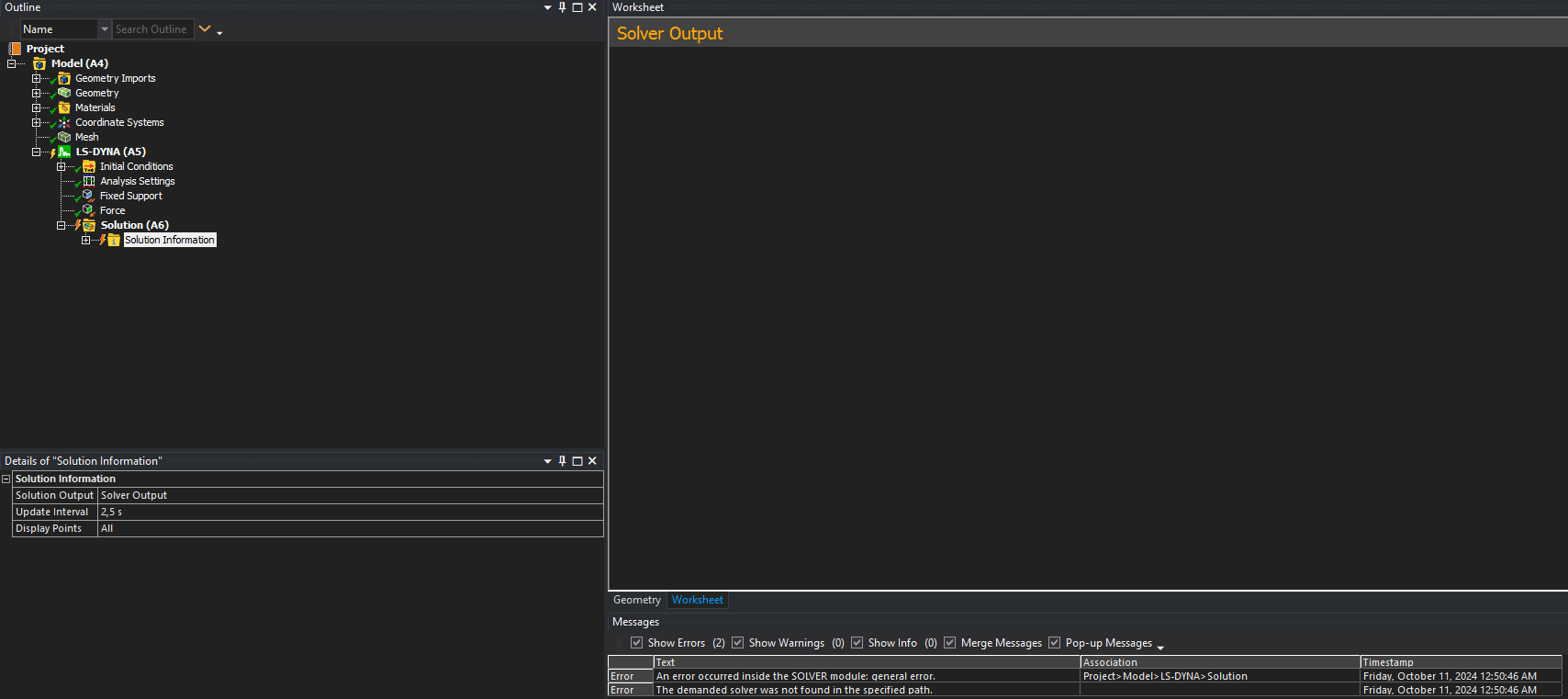
I found the issue also in “Error messages ‘The demanded solver was not found in the specified path’” on this forum, but no solution has been offered yet.
This looks like another file/path related error, there might be a link.
Kind regards,
Bram -
October 10, 2024 at 11:30 pm
Reno Genest
Ansys EmployeeHello Bram,
I think there is a bug with the student version; I tried to run with 2024R1 Student version on my personal laptop and got the same "The demanded solver was not found in the specified path" error.
The LS-DYNA solvers were not installed and are not in the installation folder. You can download the solvers here:
LS-DYNA (user=user) Download Page (lstc.com)
Username: user
Password: computer
And follow the following procedure to use the solvers inside Ansys Mechanical:
2.1. How to use LS-DYNA in Workbench (ansys.com)
Let me know if this works or not.
Reno.
-
October 11, 2024 at 7:19 pm
bram.dupre
SubscriberHi Reno,
Thank you for your feedback.
For the second URL I need to log in using my “Account Number/Customer Number” (Ansys Customer Support Space Registration Form). But I don’t have one, I guess, because I am a student.
Without the procedure I managed to change the XML (note I downloaded and installed both single and double precision version) and the following errors pop up:
Mechanical:
The test setup is a destructive tensile test.
Workbench:
One of the two maps (see XML for path)
I also tried using the ansyscl.exe for both filenames in the XML, but I beleive ls-dyna_smp_s_R15.0.2_1-g1e7cfa42b1_winx64_ifort190 and ls-dyna_smp_d_R15.0.2_1-g1e7cfa42b1_winx64_ifort190 are the actual solver file.
As you could reproduce the error of LS-DYNA, you might be able to reproduce the error of the Explicit Dynamics solution too (YT-tutorial). In that case I am sure I don’t have to look any further into the issue because I can’t solve it myself.
These are my findings so far. I will experiment further with the settings tomorrow.
Kind regards,
Bram
-
October 11, 2024 at 7:31 pm
Reno Genest
Ansys EmployeeHello Bram,
Try the followng link:
2.1. How to use LS-DYNA in Workbench (ansys.com)
The Ansys documentation should be available to everyone. The above link is for Ansys 2023R2 and the previous link was for Ansys 2024R2 documentation. The procedure is to expose different LS-DYNA solvers in Ansys Mechanical:
You need to modify the lsdyna_solvers.xml file located in C:\Users\
\AppData\Roaming\Ansys\232\ACTLSDYNA. Hopefully you can access the above procedure.
Let me know how it goes.
Reno.
-
October 12, 2024 at 11:27 am
bram.dupre
SubscriberHi Reno,
I tried to access the documentation using the new link. However, I needed to log in using a customer number in as before:
I can’t enter a customer number as I don’t have one. I tried to retrieve one using the “Support: Retrieving Your Customer Number” page (https://www.ansys.com/support/retrieving-your-customer-number), but had this as output in the cmd, probably indicating no license/customer number has been set:

There is no other ansysli_util.exe present on my C-drive.
I was able to show different versions (defined in the XML) of LS-DYNA in Mechanical, but had errors while trying to solve (see screenshot in Ansys Mechanical in my previous post).
path of the “lsdyna_solvers.xml” folder:
C:\Users\\AppData\Roaming\Ansys\v242\ACTLSDYNAKind regards,
Bram -
October 12, 2024 at 4:08 pm
bram.dupre
SubscriberUpdate 1
Update on the progress since my previous post:
I finally got a working LS-DYNA release up and running. This is what I use now (I also reinstalled the student release (R14) which is the only one I could get working yet):
I also tried to solve the input file via LS-Run and got similar results: the student version 14 does work and the 2 other R15 releases don’t (Status “Terminated”).
—
Is this the same documentation I should get via the link? I can view some documentation via the download page of LS-DYNA you send me.
Is the number of nodes limited in the normal release you send? I expect our application to be exceed the standard student limits. I might try to get the normal R14 running for that.
Kind regards,
Bram -
October 13, 2024 at 9:55 am
bram.dupre
SubscriberUpdate 2
During the testing of LS-DYNA in Mechanical, the student version of the solver just disapeared and I can’t select it anymore. When I change the XML file to add other solvers, I can select these but they don’t work (error).
In short, now I can see all defined solvers (including updates of XML) except for the student version. For any solver I select I get this error (same error as no solvers where defined at all):
The current XML (changed after the LS-DYNA student version disapeared):
LS-RUN
If I try to run the solvers via LS-RUN this is the output:
Student version (this one solves normal):
R14.1:
R15.0.2:
For the non-student version, note the license error. I don’t have a license for that, which could explain why it doesn’t solve.
For all 14.1 versions, Windows 8/10 is supported.
For 15.0.2 only Windows 10 is supported.Does that mean Windows 11 isn’t supported at all?
Kind regards,
Bram Dupré -
October 13, 2024 at 7:53 pm
bram.dupre
SubscriberUpdate 3
I found a workaround for the issue. I defined the student version (type double) next to a normal version (both 14.1) in the same version definition (see XML). When I force LS-DYNA to use Double in Mechnical, I am able to use the solver. But I beleive it is another bug that the file is not recognised in the way I described in the previous XML, or did I overlooked something?
Just as a remark, I found another unfixed bug in this and previous versions of Ansys Mechanical concering the editing of the scale bar (happens with RTX3070(ti) graphics drivers). The workaround I used via tab “Automate” was described here: https://innovationspace.ansys.com/forum/forums/topic/unable-to-edit-mechanical-contour-legend/.
Current Focus
I’m still running into the node limit in our simulation and trying to fix issues reguarding the fracture of a specimen during a tensile test (can’t find a suitable material that runs with LS-DYNA, only “General non-linear materials”, but they don’t fracture). Afterwards, I need to find a way to define a cable / rope like structure (tried using a beam, but didn’t get it working yet) for our actual research project and a way to implement the CFD on the moving rope (snapback of the mooring line). For the rope we tend to design something with the same rope-like behaviour as this (https://www.youtube.com/watch?v=CTYLuf6IU70&list=WL&index=13) in 3D via Workbench and Mechanical, but we don’t know where to start as we didn’t find similar tutorials.
Kind regards,
Bram
-
- You must be logged in to reply to this topic.



-
5289
-
1885
-
1403
-
1268
-
1021

© 2026 Copyright ANSYS, Inc. All rights reserved.


